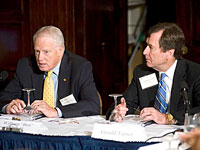NCAA News Archive - 2008
« back to 2008 | Back to NCAA News Archive Index
|
The NCAA News
The Knight Foundation Commission on Intercollegiate Athletics has announced a year-long series of meetings and research on the economics of college sports, with a particular focus on why expenses are rising faster than revenues at virtually all Division I athletics programs.
The commission at its October 27 meeting in Washington, D.C., reviewed data showing only 19 Division I institutions recorded revenue above expenses in the most recent reporting cycle, and that the median net deficit for the majority of Division I institutions increased more than 20 percent since 2004.
“It’s clear that college sports has a spending problem that must be addressed,” said William E. Kirwan, commission co-chair and chancellor of the University System of Maryland. “In the aggregate, athletics spending continues to escalate while instructional spending has remained stagnant and has even decreased at many institutions. The current economic climate and the needs of our universities require a change in this imbalance.”
The finding corroborates what NCAA presidents have been saying for the last three years – that the rate of growth in athletics spending is exceeding the rate of growth in educational spending at an unsustainable rate. Short of cost-containment measures that would violate antitrust law, the NCAA Presidential Task Force urged the development of financial “dashboard indicators” on spending patterns that presidents can use to make more informed decisions about their investment in athletics. The dashboard project was distributed to chancellors and presidents last spring as a way to moderate growth.
But the Knight Commission wants to pursue the matter further and plans to devote its next meeting in January to financial issues.
Commercialism
Commission members also used their October meeting to discuss what they call an emerging conflict between new forms of media (including fantasy sports games) and longstanding NCAA rules designed to protect college athletes from commercial exploitation.
Commissioners urged the NCAA to take a stronger stand, perhaps even a legal one, against what they see as the latest encroachment upon the principles of amateurism – a CBS Sportsline.com college football fantasy game. But NCAA officials say the Association does not own the publicity rights of student-athletes and thus cannot force legal action. A similar case several years ago involving Major League Baseball was ruled in favor of the fantasy league provider.
“College athletes in fantasy games and video games may seem trivial to some, but these and other forms of new media pose new challenges to the long-held distinction between commercial activity featuring teams and that which focuses on individual athletes,” said R. Gerald Turner, co-chair of the Commission and president of Southern Methodist University. “We continue to believe that universities need to treat athletes fairly and equitably, and for third parties to use them in commercial products and advertisements violates that principle.”
Knight Commission member Len Elmore, ESPN analyst and partner at Dreier, LLP, added that “many observers believe this invasion of commercialism appears to be inevitable given new technologies that are intersecting with consumer demand for interactivity and reality-based gaming. If college athletes’ names and likenesses are to be used in commercial products, advertisements or fantasy sports games, there must be a way to balance the inequities by providing some sort of benefit to athletes through mechanisms other than ‘pay for play.’”
The commission heard from a panel of lawyers and media experts, who said that colleges and athletes could have a case to prevent media companies from creating fantasy leagues using athlete names and likenesses.
After that, a panel of recent student-athletes, including Colorado football player Jeremy Bloom, Lafayette basketball player Kerry Kenny, Ohio State quarterback Craig Krenzel and Georgia Tech basketball player Marvin Lewis, generally agreed that college athletes should not be paid like professionals, but that it might be possible to examine other ways of supporting athletes such as providing postgraduate scholarships.
The NCAA has established several funds to support athlete needs, and funding for such may increase as streams of revenue do. The former student-athlete panelists also agreed that third parties should not be allowed to profit from the images and likenesses of college athletes.
The meeting sessions will be accessible via podcast on the commission’s Web site on October 29.

